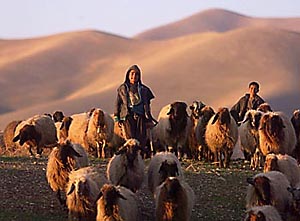Understanding the Turkey-Kurd Conflict

 Boys from a Kurdish family herd sheep in Suleymaniya, in northern Iraq. Between 1974 and 1991, Iraq's army evicted 780,000 people from nearly all 4,460 villages in the Kurdish region. |
Who is Ocalan?
Abdullah Ocalan, leader of rebel group the Kurdistan Workers Party (PKK), was convicted of treason and separatism on June 29, 1999, and sentenced to death. He was accused of leading a 15-year war that has left more than 35,000 people dead.
Ocalan (pronounced OH-ja-lan) had been captured in Nairobi on February 16, after spending more than a decade on Turkey's "most wanted" list. He offered to work for peace between the rebels and the government in exchange for leniency, but promised a "bloodbath" if he were executed. In the wake of the verdict, Kurdish guerrillas unleashed a wave of attacks on police and civilians throughout Turkey.
Other European countries have harshly criticized the sentencing, which was upheld in November 1999 following the decision's appeal. On Jan. 12, 2000, the Turkish government announced that Ocalan's sentence would be suspended until the case is reviewed by a European court. If Turkey goes forward with Ocalan's execution, the country may jeopardize its chance to join the European Union.
Many Kurds feel Ocalan's death would deal a critical blow to their centuries-long struggle to gain a land they can call their own. Recent military defeats, as well as the Turkish government's offers of leniency towards guerrillas who lay down their arms, have already thrown the movement into disarray.
The PKK has been the strongest Kurdish revolutionary organization for several years. With their cultural identity under oppression and a scarcity of prominent Kurdish figures to advance their cause, many Kurds had invested their hope in Ocalan.
- The Kurdish population stands at about 20-25 million. It is concentrated in the parts of eastern Turkey, Syria, Iran, and Iraq that make up the region known as Kurdistan. About 12 million Kurds live in the southeast region of Turkey alone.
- Twenty percent of Turkey's population is Kurdish. Iraq is 15-20 percent Kurdish; Syria, less than 10 percent; and Iran, 7 percent.
- The majority of Kurds are devout Sunni Muslims.
- At least 134 teachers have been murdered under Ocalan's orders. One of Ocalan's aims is to protect Kurds from being forced to learn the Turkish language and abandon the Kurdish culture.
- The Turkish army is responsible for burning almost 3,000 Kurdish settlements and displacing two million people.
- Ocalan, who has a tyrannical reputation, has been at the helm of the PKK, commanding its rebels, since its inception. He has never fought in a battle.
- More than 35,000 people have died in the Kurdish conflict since the PKK turned to terrorism in 1984.
- Turkey's last execution was in 1984.
